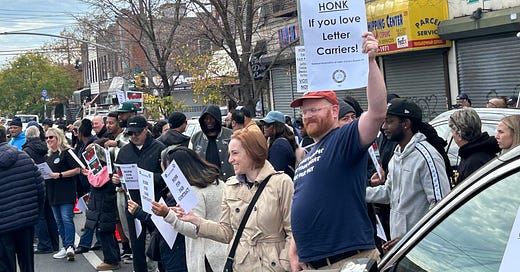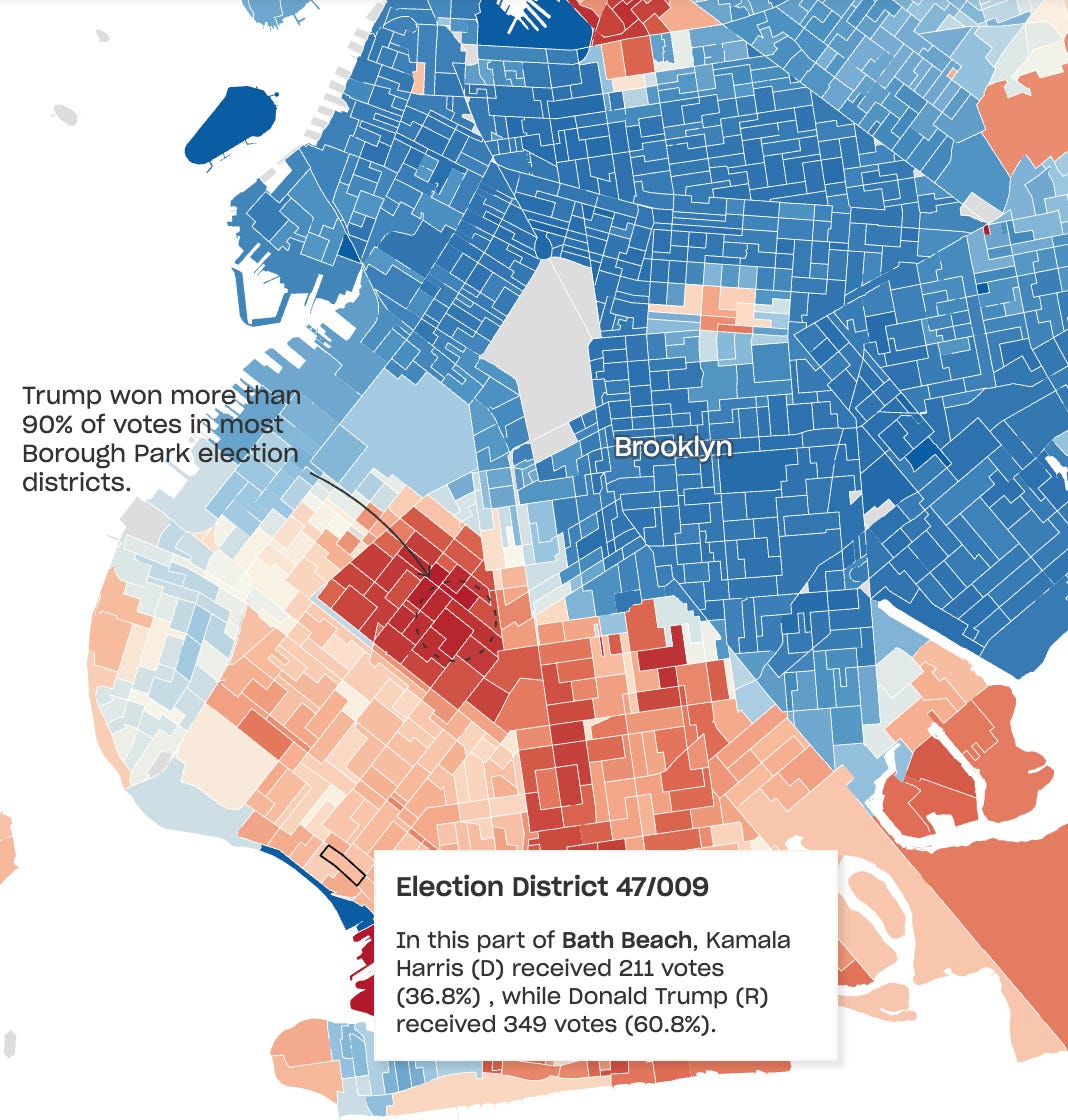Welcome to a Monday edition of Progress Report.
Even before last week’s election, I’d begun to think about the next iteration of Progress Report and how it can most effectively serve as both truthful journalism and facilitator of meaningful change. I’ve never been interested in pure punditry, nor do I plan to be a shill; at the same time, purely “objective” reporting has also very clearly failed to meet this moment.
I want every issue of Progress Report to be useful, and right now, I’m going to focus on using my reporting to expose malevolent actors, highlight important movements that haven’t gotten enough (or any) coverage, connect activists with roadmaps for grassroots success, and push for accountability where necessary. There are already several reported stories in the works, because we really can’t waste any time.
Tonight, we’ll look at an uprising that’s happening nationwide, but with virtually nobody paying attention.
Note: This is going to be a long four years — and perhaps much longer, if Donald Trump and his newly empowered Republican Party accomplish their goals.
As right-wing media metastasizes, billionaires use outlets as tools of appeasement, mainstream media fails, and corporations sell off news divisions, we need independent media to step into the breach. Please make Progress Report and make this work possible — just $5 a month makes all the difference.
I spent much of my Sunday down in South Brooklyn, talking and communing with pissed off letter carriers. There were upward of 100 of them stationed outside their local NALC Branch 41 union hall, where they crowded the narrow sidewalk, spread across the street, and sat atop a fire engine driven over for a raucous protest on an otherwise quiet morning.
The paltry tentative contract agreement with the United States Postal Service revealed late last month was frequently described as a “slap in the face” by both rank and file carriers and local union leaders from throughout the city. Speakers stoked and harnessed members’ outrage at the deal, with most ire focus trained on the 1.3% raise that NALC President Brian Renfroe had reached in secret negotiations with postmaster general Louis De Joy.
The talks stretched 600 days beyond the expiration of the union’s last contract, during which time Renfroe regularly promised members a “historic” new deal that would be worth the wait.
Renfroe’s rhetoric alluded to deals won by the UAW, Teamsters, and other unions in recent years, though members understood that without the right to strike, they did not have the same leverage. Still, even a 10% raise over several years would have been gigantic for the 277,000 active carriers, who now do an increasingly dangerous and exhausting job for a starting rate below what’s being offered by many fast food restaurants. Instead, they wound up with that rounding error of an annual raise and other concessions, which local president John Cruz said reflected Renfroe’s first offer. They never stood a chance at a real raise with negotiations being handled by this one man.
I’ve heard from carriers all over the country who said that they pursued a government job because they thought it would provide a solid middle class living, but shabby prior contracts and inflation have instead left many members in poverty. People on Sunday spoke about co-workers who were evicted from their apartments and were living in RVs beneath the Belt Parkway. After the rally and Q&A session about the contract, Cruz showed us a shower he had installed in the union hall after one member became homeless.
The National Association of Letter Carriers has been a sleeping giant since the 1970s, when its members engaged in a wild cat strike to protest a bad deal struck between the union’s president and Richard Nixon. There’s a mural referencing that strike inside the Branch 41 office, celebrating a key moment in the union’s history in obscurity, hidden from the public like most other moments in labor history.
It’s been many decades since a tentative contract has fomented this type of anger among the rank and file, who generally just vote, however begrudgingly, to ratify whatever deal the president recommends. A lot of factors have made this a very different proposition, some of which go back to the risks they took during Covid. Others are more about how the job has changed since then, including the cost of their uniforms, which they can only purchase piecemeal from a specific vendor that has taken to price gouging.
Under de Joy’s reform plan, carriers have to drive long distances to reach super distribution centers that have cost them jobs and hours on the clock, and management abuses, including threats of violence and the heat training record falsification, have become rampant.
There are challengers lining up to face Renfroe in the 2026 union election, including one of his own deputies. I can’t imagine he’ll win another term, perhaps unless this contract winds up driving away so many pissed off mid-level letter carriers.
The political implications — locally and nationally
I’ve been to a lot of union strikes and rallies over the years, and few have matched the sheer organic energy of this one. It’s also the only significant scheduled union rally I’ve experienced where there was not a single politician to be found.
Democrats tend to find their way to these sort of events, if only for a minute or two, but a vast majority of the city and state Democratic caucus was in Puerto Rico for a conference called Somos. It’s the sort of destination where good lawmakers prep for the coming year with allies and community advocates, while less civic-minded lawmakers enjoy the company of lobbyists over expensive rums.
It also doesn’t help that because it’s a national union that has traditionally operated from the top down, NALC hasn’t played much of a part in the New York labor council, which invites politicians to these kinds of events. I know some who would have at least been interested, but it’s also something that really local officials would have known about had they been engaged with the community in the right way. If nothing else, I’m raising the flag here because there is a clear line between this and the lessons of last week’s elections.
Superficially, the politics of this thing may seem dicey, but doubts don’t withstand more than a few moments of scrutiny. Yes, it’s an uprising against a union boss, but one led by union locals and rank and file members who deeply believe in the labor movement; several workers’ eyes welled with tears when discussing the hard work that their branch presidents have put in for members over the years. The same vehement pro-union sentiment has been expressed by members I’ve spoken with in Fort Worth, Cincinnati, and Nashville, which aren’t exactly hotbeds of labor activity.
Democrats wary of playing into stereotypes of crooked unions should look to UAW reformer Shawn Fain, who ran as an upstart and rebuke to a leadership that was toppled by federal investigators. most Democrats were really all that concerned with organized labor’s reputation or wellbeing, they wouldn’t be in this situation with working class voters.
If anything, this is the kind of eruption that Democrats have to rush towards if they want any chance of rebuilding their working class coalition.
Branch 41 has its office on Bath Avenue, a major street that runs through several multiethnic neighborhoods. Bath Beach, the neighborhood where it’s headquartered, is largely made up of Asian immigrants, Russians, and Italians, while the surrounding areas are a melting pot of every ethnic group that’s ever settled in New York City. It’s the kind of place that Democrats always thought would reflexively support the party, only to wake up to a blood bath of a local map, awash in red.
There’s no single explanation for the shift, but the puzzle pieces should all fit together to anyone paying attention. Immigrant communities are often culturally conservative, and Democrats have in many places lost the deep personal connections and block-by-block familiarity that overcame any conflict with the party’s liberal inclinations.
Between the affordability crisis and parochial issues surrounding safety, shelters, and schools, not to mention ethnic right wing media, a shift almost seems inevitable. Accordingly, the district ousted a Democratic state senator for a Republican former police officer. Yet every car that passed by honked in support of the union workers, including at least one with a guy waving a MAGA hat sitting in the passenger’s seat.
The membership isn’t limited to neighborhood residents, but it’s a blue collar job that does not require a college degree and includes every carrier from Staten Island, so it’s not a big leap to assume that Branch 41, like many unions, has a pretty prominent red lean. As I listened to New York union members discussing Trump’s business intelligence, it was clear to me that Democrats have more work to do than most of them even realize.
The national aspect of this situation should make it even more inviting for Democrats in the South and Plains states, where they rarely have the opportunity to show solidarity with the union movement or any other organized group of working people. But again, there has not been, as far as I can tell, any real outreach, effort, or presence from elected officials since the tentative agreement was released. Whether Democrats get involved or sit this out won’t impact my coverage of the fight, but it’ll be indicative of how much they care about turning things around for themselves.
Democrats became the default for working people through block-by-block services, and as that connection faded, cultural affinities and a sense of abandonment led to this collapse that manifested in election results last week. Partisans can sigh and blame working people for voting against their own interests, but any hope of reversing the political collapse needs to start with showing up and proving that they will listen to what they actually need.
Wait, Before You Leave!
Progress Report has raised over $7 million dollars for progressive candidates and causes, breaks national stories about corrupt politicians, and delivers incisive analysis, and goes deep into the grassroots.
None of the money we’ve raised for candidates and causes goes to producing this newsletter or all of the related projects we put out. In fact, it costs me money to do this. So, I need your help.
For just $5 a month, you can buy a premium subscription that includes:
Premium member-only newsletters with original reporting
Financing new projects and paying new reporters
Access to upcoming chats and live notes
You can also make a one-time donation to Progress Report’s GoFundMe campaign — doing so will earn you a shout-out in the next weekend edition of the newsletter!








I too believe that if Bernie had been elected, we would not be where we are now. His entire campaign was based on helping working people. The establishment Democrats need to think long and hard before they kneecap the election bids of those who seek real change.
Bernie Would Have Won.